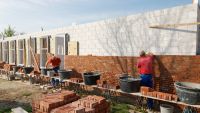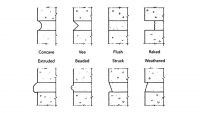Hurricane Guidelines: Homes Featuring Brick Veneer Far Exceed Strictest Hurricane Building Standards
By Masonry
A new study shows that homes built with brick offer dramatically more protection from wind-blown debris than homes built with vinyl or fiber-cement siding.
The study, conducted at the Wind Science and Engineering Research Center at Texas Tech University, demonstrated that a medium-sized wind-blown object, such as a 7.5-foot-long 2x4, would penetrate homes built with vinyl or fiber-cement siding at a speed of 25 miles per hour (mph). By comparison, the same object would need to travel at a speed exceeding 80 mph in order to penetrate the wall of a brick home.
In a test that simulated wind-blown debris traveling at a speed of 34 mph, the 2x4 bounced off the brick veneer with no damage to the interior wall. When the same test was conducted on a vinyl or fiber-cement sided wall, the 2x4 easily penetrated the wall, with more than five feet of the timber passing through the interior wall. The test was representative of weather that would generate wind speeds of 100 to 140 mph.
"This research demonstrates that buildings and homes built with brick provide a huge advantage over those built with lightweight sidings," said Richard Jennison, President and CEO of the Brick Industry Association (BIA). "Not all walls are built the same, and they don't perform the same. Brick provides safety for building occupants and security for property."
The study, which was sponsored by the BIA, consisted of a series of tests that simulated the potential damage that could result from wind-blown debris by propelling a nine-pound 2x4 at samples of typical residential wall construction. This size 2x4 is representative of typical wood framing used in home construction and could be expected to become airborne in high winds.
The Wind Science and Engineering Research Center, which conducted the study, was established after a devastating tornado in Lubbock, Texas, and is recognized as the premier location for impact testing of wind-blown debris. Dr. Richard M. Bennett, P. E., of the University of Tennessee Department of Civil and Environmental Engineering, was the principal investigator.
The tests found that homes made with brick exceed the 34 mph impact resistance requirement for high-velocity hurricane zones in the Florida building code. Brick also exceeds Florida's impact resistance requirements for essential facilities in hurricane areas.
The impact test procedures in the study are used to rate wall, door and window protection assemblies for damage in high-wind situations. The tests used four-feet-wide by four-feet-tall wall segments constructed in accordance with the International Residential Code provisions for high-wind areas. Each wall was made up of 1/2-inch gypsum board, 2x4 wood studs at 16 inches on center with fiberglass insulation between, 1/2-inch Oriented Strand Board (OSB) sheathing, and brick veneer or siding attached with the appropriate ties or nails.
The tests were the second phase of a two-year study conducted by the brick industry on the impact resistance of typical residential wall construction to wind-blown debris. The first part of the study, which was completed last December, included a review of building codes and standards requirements with a focus on impact tests of siding materials. The tests at Texas Tech University took place in August 2004.
About the Author
Masonry, the official publication of the Mason Contractors Association of America, covers every aspect of the mason contractor profession - equipment and techniques, building codes and standards, business planning, promoting your business, legal issues and more. Read or subscribe to Masonry magazine at www.masonrymagazine.com.


















